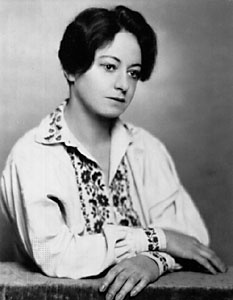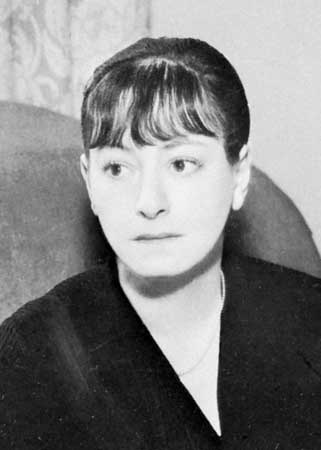Parker, Dorothy
American author
née Dorothy Rothschild
born Aug. 22, 1893, West End, near Long Beach, N.J., U.S.
died June 7, 1967, New York, N.Y.
 American short-story writer and poet, known for her witty remarks.
American short-story writer and poet, known for her witty remarks.Dorothy Rothschild was educated at Miss Dana's School in Morristown, New Jersey, and the Blessed Sacrament Convent School, New York City. She joined the editorial staff of Vogue magazine in 1916 and the next year moved to Vanity Fair as a drama critic. In 1917 she married Edwin Pond Parker II, whom she divorced in 1928 but whose surname she retained in her professional career.
Discharged from Vanity Fair in 1920 for the acerbity of her drama reviews, she became a freelance writer. Her first book of light, witty, and sometimes cynical verse, Enough Rope, was a best-seller when it appeared in 1926. Two other books of verse, Sunset Gun (1928) and Death and Taxes (1931), were collected with it in Collected Poems: Not So Deep as a Well (1936). In 1927 Parker became book reviewer, known as “Constant Reader,” for The New Yorker, and she was associated with that magazine as a staff writer or contributor for much of the rest of her career.
Early in the 1920s she had been one of the founders of the famous Algonquin Round Table at the Algonquin Hotel in Manhattan and was by no means the least of a group of dazzling wits that included Robert Benchley, Robert E. Sherwood, and James Thurber. It was there, in conversations that frequently spilled over from the offices of The New Yorker, that Parker established her reputation as one of the most brilliant conversationalists in New York. Her rapier wit became so widely renowned that quips and mots were frequently attributed to her on the strength of her reputation alone. She came to epitomize the liberated woman of the 1920s.
In 1929 Parker won the O. Henry Award for the best short story of the year with “Big Blonde,” a compassionate account of an aging party girl. Laments for the Living (1930) and After Such Pleasures (1933) are collections of her short stories, combined and augmented in 1939 as Here Lies. Characteristic of both the stories and Parker's verses is a view of the human situation as simultaneously tragic and funny.
 In 1933, newly married, she and her second husband, Alan Campbell, went to Hollywood to collaborate as film writers, receiving screen credits for more than 15 films, including A Star Is Born (1937), for which they were nominated for an Academy Award. She became active in left-wing politics, disdained her former role as a smart woman about town, reported from the Spanish Civil War, and discovered that her beliefs counted against her employment by the studios in the fervour of anticommunism that seized Hollywood after World War II. She wrote book reviews for Esquire magazine and collaborated on two plays: The Coast of Illyria (first performance 1949), about the English essayist Charles Lamb (Lamb, Charles), and The Ladies of the Corridor (1953), about lonely widows in side-street New York hotels.
In 1933, newly married, she and her second husband, Alan Campbell, went to Hollywood to collaborate as film writers, receiving screen credits for more than 15 films, including A Star Is Born (1937), for which they were nominated for an Academy Award. She became active in left-wing politics, disdained her former role as a smart woman about town, reported from the Spanish Civil War, and discovered that her beliefs counted against her employment by the studios in the fervour of anticommunism that seized Hollywood after World War II. She wrote book reviews for Esquire magazine and collaborated on two plays: The Coast of Illyria (first performance 1949), about the English essayist Charles Lamb (Lamb, Charles), and The Ladies of the Corridor (1953), about lonely widows in side-street New York hotels.Parker's witty remarks are legendary. When told of the death of the taciturn U.S. president Calvin Coolidge, she is said to have asked, “How can they tell?” Of Katharine Hepburn's performance in a 1934 play, Parker said she “ran the gamut of emotions from A to B.” She also is responsible for the couplet “Men seldom make passes / at girls who wear glasses.” She lived in Hollywood until Campbell's death in 1963 and then returned to New York City.
Additional Reading
Arthur F. Kinney, Dorothy Parker (1978); and Marion Meade, Dorothy Parker: What Fresh Hell Is This? (1987), are solidly researched biographies.
- Carnarvon, George Edward Stanhope Molyneux Herbert, 5th earl of, Baron Porchester Of Highclere
- Carnarvon Gorge
- Carnarvon, Henry Howard Molyneux Herbert, 4th earl of
- Carnarvon Range
- Carnatic music
- Carnatic Wars
- carnation
- carnauba wax
- Carneades
- Carnegie, Andrew
- Carnegie, Dale
- Carnegie Hall
- Carnegie Mellon University
- Carneia
- carnelian
- Carnera, Primo
- Shabaka
- Shabazz, Betty
- Shabbetai Tzevi
- Shabestarī, Saʿd od-Dīn Maḥmūd
- Shabonee
- shabunder
- Shackleton Ice Shelf
- Shackleton, Sir Ernest Henry
- shad